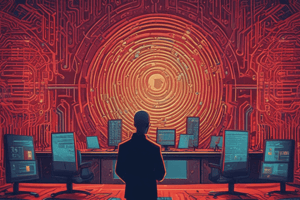Podcast
Questions and Answers
Which devices are covered by the Anti-virus and Malicious Code Policy?
Which devices are covered by the Anti-virus and Malicious Code Policy?
- Only desktop computers
- Only laptops
- Only workstations
- All information processing facilities and mobile computing devices (correct)
Who is responsible for ensuring a suitable anti-virus solution is in place?
Who is responsible for ensuring a suitable anti-virus solution is in place?
- Network administrators
- Third-party vendors
- IT Security Manager (correct)
- Users
What must be done with files received via the internet?
What must be done with files received via the internet?
- Check them for malicious software before use or distribution (correct)
- Delete them immediately
- Forward them to colleagues
- Open them without any checks
What must anti-virus software do proactively and periodically?
What must anti-virus software do proactively and periodically?
Which systems must have anti-virus protection?
Which systems must have anti-virus protection?
What must be running at all times on workstations?
What must be running at all times on workstations?
What is required to prevent malicious software from entering the network?
What is required to prevent malicious software from entering the network?
What may result in disciplinary action if violated?
What may result in disciplinary action if violated?
What must be done with anti-virus software on laptops when not connected to the network?
What must be done with anti-virus software on laptops when not connected to the network?
Study Notes
Anti-virus and Malicious Code Policy
- The purpose of this policy is to protect networks and information processing facilities from malicious software.
- The policy applies to all information processing facilities and mobile computing devices under the control of the company.
- Approved anti-virus software must be installed and kept current on all systems and devices.
- Files received via the internet must be checked for malicious software before use or distribution.
- The IT Security Manager is responsible for ensuring a suitable anti-virus solution is in place.
- Users have responsibilities such as being cautious with suspicious emails and not downloading unauthorized software.
- Third-party vendors must provide updates and support when required.
- Anti-virus software must proactively and periodically scan for viruses and be actively running.
- All systems connected to the network running Microsoft Windows must have anti-virus protection.
- Workstations must have anti-virus protection running at all times, including on removable media.
- Laptops must have the same anti-virus standard as desktops, with alternative arrangements for virus definition updates when not connected to the network.
- Gateway virus scanning and e-mail content scanning are required to prevent malicious software from entering the network.
- Violations of this policy may result in disciplinary action, unless a valid business case has been approved.
Studying That Suits You
Use AI to generate personalized quizzes and flashcards to suit your learning preferences.




